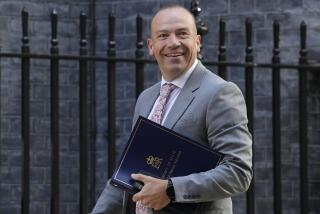N. Ireland Peace Dealt a New Blow
- Share via
LONDON — In another blow to Northern Ireland’s eroding peace process, the British government made it official Friday that three Protestant paramilitary forces have ended a seven-year cease-fire.
The statement followed months of attacks on Roman Catholics and police in the provincial capital, Belfast, by the Ulster Defense Assn., or UDA, the largest of the pro-British paramilitary groups, and a splinter group, the Ulster Freedom Fighters.
“They have systematically breached their cease-fire, and the patience of the people of Northern Ireland has run out,” said Northern Ireland Secretary John Reid.
The Loyalist Volunteer Force also has returned to violence, Reid said, adding that the government has “clear information” linking the group to the killing of a Catholic journalist two weeks ago.
Martin O’Hagan--an investigative reporter with the Sunday World, which is based in the Irish capital, Dublin--was shot on his way home in Lurgan, about 20 miles southwest of Belfast. He reportedly had been working on an article linking paramilitary members to a drug-trafficking ring.
A group calling itself the Red Hand Defenders claimed responsibility for the shooting, but the group is believed to be a front for the Loyalist Volunteer Force. O’Hagan had been threatened by the force for other articles he had written.
“They seem determined to spurn the opportunity--given to them by the people--to make the transition from violence to democracy,” Reid said.
No immediate action was expected against the groups, though police in theory could rearrest some members previously released.
The UDA called a cease-fire in 1994, the same year the Irish Republican Army declared a truce, opening the way to peace talks. The Loyalist Volunteers also called a cease-fire after politicians reached the province’s 1998 Good Friday peace pact.
Both groups subsequently backed the Good Friday deal, which established a power-sharing government in Northern Ireland.
But Protestant support for the peace agreement has dwindled as Catholics have consolidated their political power in Northern Ireland, while the IRA still refuses to give up its weapons. Street clashes, shootings and pipe-bomb attacks on Catholics and police escalated to the point that the British government felt it had no choice but to declare the cease-fires finished.
“They’re saying what everyone knows,” said David Ervine, whose Progressive Unionist Party is linked to the only Protestant paramilitary group still honoring a cease-fire, the Ulster Volunteer Force.
The spiral of violence coincides with a collapse of the political process. David Trimble, chief of the Ulster Unionist Party, is threatening to lead Protestants out of the power-sharing government next week. If he does, the government will be suspended, and Northern Ireland will return to direct British rule for the second time since 1998.
That could spell the end of the peace process unless the IRA decides to give up its guns.
John White, leader of the UDA’s political wing, warned the British government that its declaration of an end to the cease-fires could lead to more bloodshed, not less. He said some members would interpret Friday’s declaration as “a license to go out and do things they normally would not have done because of the restraints placed on them by that cease-fire.”
Reid’s announcement followed a night of violence in a UDA stronghold of West Belfast and came two weeks after he gave the militia a final warning to end violence.
The IRA has been under increasing pressure from London, Dublin and Washington to begin disarming since several alleged IRA members were arrested in Colombia during the summer and accused of aiding guerrillas there. The Sept. 11 attacks on the United States added to American impatience with the armed group and further reduced its room to maneuver, even though the Catholic militants are still honoring their cease-fire.
“The IRA is going to put their arms beyond use,” Ervine said. “They won’t do it for unionists [but because] they don’t have any choice. I think we’re at the endgame.”
More to Read
Sign up for Essential California
The most important California stories and recommendations in your inbox every morning.
You may occasionally receive promotional content from the Los Angeles Times.













